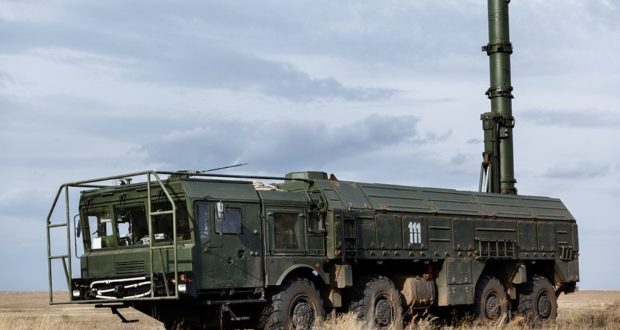15 January, 2018
The House of Commons Defence Committee has published the HSC’s evidence to the committee’s inquiry into the potential end of the Intermediate Nuclear Forces (INF) Treaty.
The US first publically raised concerns that Moscow had violated the INF Treaty through the development of a new ground-launched cruise missile that fell within its range parameters in 2014. In late 2017, the US publicised the Russian designation of the missile – the 9M729 – and claimed that it had been fielded in limited numbers. It was also announced that the US would take measures to counter Russia’s treaty violation.
On 20 October, 2018, President Trump announced that the US would pull out of the agreement. On 4 December, US Secretary of State, Mike Pompeo, gave Russia 60 days to return to compliance with the treaty, and indicated that failure to do so would result in the US giving the required six-month notice of its own withdrawal. On the same day, NATO released a statement agreeing with the US assessment that Moscow had deployed an illegal weapon. Russia has continuously denied any wrong-doing, whilst at the same time raising dubious claims about US compliance with the agreement.
The HSC’s evidence seeks to address the broad issues raised by the inquiry, but will focus on the under-recognised point that the termination of the INF Treaty will also have consequences for non-nuclear systems.
In summary:
- The US and other NATO nations are in agreement that Russia has fielded a ground-launched cruise missile known as the 9M729 (designated by NATO as the SSC-8 Screwdriver) which violates the INF Treaty ban on the US and Russia possessing ground-launched surface-to-surface missiles with a range of 500-5,500 km.
- It is vital to appreciate that the INF Treaty bans any ground-launched missile system that falls within the agreement’s range parameters regardless of the warhead type. Notably, the 9M729 is believed to be capable of carrying a nuclear or conventional warhead.
- Russia has long understood the potential of conventional precision-guided weapons with ranges that fall within the spectrum covered by the INF Treaty. In recent years, Moscow has modified its military doctrine to incorporate such systems into its approach to deterrence and warfighting, and developed weapons systems required to implement this new doctrine.
- Moscow possesses a number of INF Treaty-compliant conventionally armed missile systems, including some capable of reaching the UK such as the ship and submarine-launched Kalibr 3M-14 and the air-launched Kh-101. Whether the 9M729 could reach Britain is unclear.
- It would be more economical for Russia to field ground-launched missile systems with an INF Treaty-violating range than to depend on treaty-compliant air and sea-launched weapons for long-range conventional strikes against targets in Eastern and Central Europe. Such a shift would also potentially release air and sea-launched systems for wartime use against more challenging targets – including in the UK.
- Without the INF Treaty, Russia would be free not only to widely deploy the 7M729, but also to develop new ground-launched conventionally-armed hypersonic missiles capable of reaching the UK from Russian territory.
- Russia’s unsupportable accusations that the US is itself violating the INF Treaty do not indicate that a good-faith effort on Moscow’s part to sustain the agreement is likely, and transforming the treaty into a multilateral agreement encompassing countries such as China appears impractical.
- NATO’s already extensive range of air and sea-launched cruise missiles, a possible multi-national ground-launched capability, and the potential for enhancing the alliance’s ground-based air defence system all offer avenues to counter the non-nuclear consequence of the INF Treaty’s termination.
The full submission is available here.
Image: Russia’s 9M728 Iskander-K ground-launched cruise missile system (source: Mil.ru)
 Human Security Centre Human Rights and International Security Research
Human Security Centre Human Rights and International Security Research




